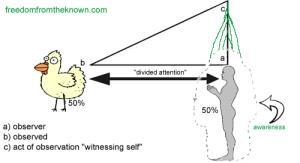I came across Ivan Campuzano recently, a blogger who shares perceptions based on personal experience, and the integrated teachings of: J. Krishnamurti, Bhagwan Shree Rajneesh, Gurdjieff, P. D. Ouspensky, Nisargadatta Maharaj, Paramahansa Yogananda, Samael Aun Weor, and A. H. Almaas. He reminded me of how I used to attempt self-observation before I found Dhamma.
As a Gnostic student, I attempted to willfully divide my awareness between (b) external perceptions (a) internal perceptions, not only sensations, emotions and feelings, but also thoughts, and finally (c) to be aware of awareness itself.

Image borrowed from: http://ivancampuzano.com/how-to-really-pay-attention-learning-to-divide-your-attention/
My Gnostic teachers explained that this practice should be done constantly throughout the day. Obviously, this was far too difficult for me back then, it required a lot of conscious effort and it felt awkward to be witnessing myself while conversing with people or performing a difficult task. I would often stop practicing for fear that I couldn’t pay enough attention to something if I was simultaneously remembering myself. When I discovered Vipassana, I noticed that my self-awareness increased as a by-product, so I gave up the arduous and constant task of deliberate self-observation.
However, I’ve recently committed myself to a few intense weeks of solitary computer work, and found that though I meditate 1-2 hours per day, I’m still quite easily distracted. My mind wanders and I follow. So I decided to revisit self-observation. Watching myself sense, think, feel, and work I noticing that with such vigilant intent my mind didn’t have a chance to wander or even get bored. No Yawning, no need to make priority lists because I remembered everything and didn’t get confused. Time seemed to slow down, and I was much more likely to notice where I could put in the extra effort to streamline my work-flow.
Though this is still a challenge, Vipassana has clearly given me and edge; self-observation came much easier than it did before. Instead of feeling distracted by relentlessly resetting focus, I felt empowered by constantly nipping distractions. I can also see how in the cases of sensual pleasure, self-awareness could also serve to ground me, but I’m still a little unsure about using it in highly rational interpersonal situations. For example, in a class discussion, if a lot of abstract thinking is required to respond quickly, would self-witnessing benefit me or just slow me down? I guess I will just have to watch and see.
